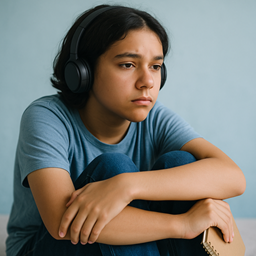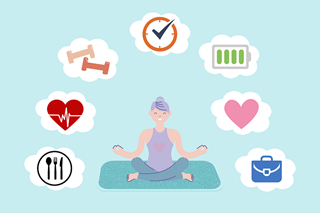Mental Health in Teens: In today’s fast-paced digital age, mental health in teens is emerging as a critical topic of discussion. With rising academic pressure, social media influence, peer comparison, and changing family dynamics, teenagers are increasingly vulnerable to anxiety, depression, and other emotional challenges. Recognizing and addressing teen mental health is no longer a choice — it’s a necessity.

Table of Contents
🌟 Why Mental Health in Teens Matters
Adolescence is a transformative stage — physically, emotionally, and mentally. The teenage brain is still developing, and the ability to manage stress, relationships, and emotions can be limited. Poor mental health can:
- Affect academic performance
- Lead to social withdrawal
- Increase risk of substance abuse
- Result in self-harm or suicidal thoughts
Early intervention can prevent long-term consequences and foster resilience and emotional intelligence.
⚠️ Common Mental Health Issues Among Teens
- Depression: Persistent sadness, irritability, and loss of interest in activities are common signs.
- Anxiety Disorders: Excessive worry, panic attacks, and social phobia affect a teen’s daily functioning.
- Eating Disorders: Issues like anorexia or bulimia often stem from body image concerns.
- ADHD (Attention-Deficit/Hyperactivity Disorder): Difficulty focusing, impulsivity, and hyperactivity.
- Substance Abuse: Coping with emotional distress through alcohol, drugs, or vaping.

🔍 Signs Parents & Teachers Should Watch For
Being observant and supportive can make a significant difference. Some warning signs include:
- Sudden drop in grades or school performance
- Isolation from family and friends
- Extreme mood swings or irritability
- Changes in sleep or eating patterns
- Expressions of hopelessness or thoughts of self-harm
If these symptoms persist, it’s important to seek professional help.
❤️ How to Support a Teen’s Mental Health
Parents, guardians, teachers, and society as a whole play a crucial role in nurturing mental well-being. Here’s how you can help:
✅ Open Communication: Create a non-judgmental space where teens feel safe to express themselves.
✅ Limit Screen Time: Encourage offline activities to reduce social media anxiety.
✅ Promote Physical Activity: Exercise is a natural mood booster and reduces stress.
✅ Encourage Healthy Sleep: 8–10 hours of quality sleep is vital for emotional balance.
✅ Be Supportive, Not Critical: Avoid harsh judgments and instead offer empathy and guidance.

🧑⚕️ When to Seek Professional Help
If symptoms interfere with everyday functioning, it’s time to consult a mental health expert. Psychologists, counselors, or psychiatrists can provide therapy, medication, or both, depending on the situation.
Today, platforms offering online therapy for teens in India are gaining popularity, making help more accessible and less stigmatized.
🌈 Creating a Mentally Healthy Future Generation
Teenagers are the torchbearers of tomorrow. As a society, we must:
- Raise awareness about mental health in schools and communities
- Normalize seeking therapy and emotional support
- Invest in mental health education and outreach programs

Cognitive Behavioral Therapy (CBT): Path to Mental Wellness
🔚 Final Thoughts
Mental health in teens is a topic that deserves urgent attention and continuous support. By staying informed, showing compassion, and encouraging healthy habits, we can make a lasting impact on the emotional well-being of our youth.

1 thought on “🧠 Mental Health in Teens: Supporting & Empowering Youth”